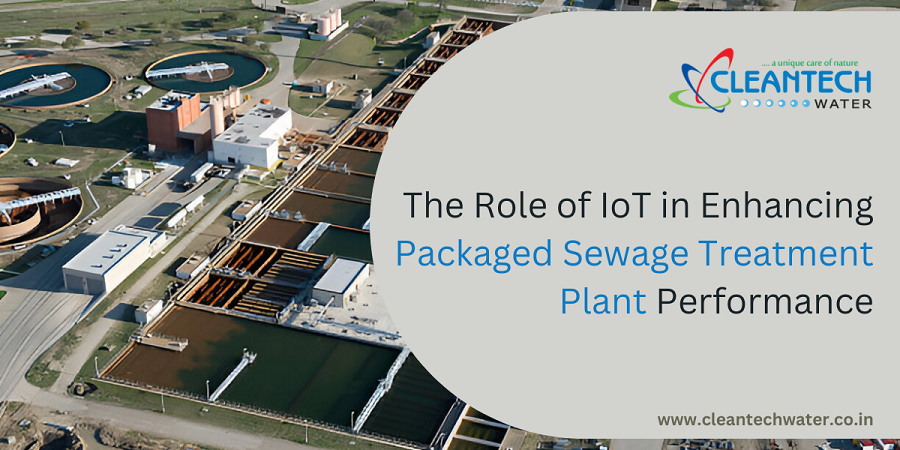As industries strive for enhanced efficiency and environmental compliance, the integration of Internet of Things (IoT) technology into packaged sewage treatment plants has become increasingly vital. IoT’s role in optimising the performance of these systems is significant, offering a range of benefits from real-time monitoring to predictive maintenance.

Introduction to IoT
The Internet of Things (IoT) refers to the network of interconnected devices that communicate and exchange data over the Internet. IoT devices are embedded with sensors, software, and other technologies that enable them to collect and transmit data. This connectivity allows for automated processes and enhanced control across various applications.
In industrial automation, IoT plays a crucial role by providing real-time insights and improving operational efficiency. For example, in a packaged sewage treatment plant, IoT can monitor system parameters such as flow rates, chemical levels, and energy consumption. This data is analysed to ensure optimal performance and to address potential issues before they escalate.
The importance of IoT in sewage treatment plants cannot be overstated. It enables operators to maintain high standards of efficiency and compliance by offering continuous monitoring and control.
The integration of Internet of Things (IoT) technologies into packaged sewage treatment plants (STPs) is revolutionising how these systems operate, offering significant improvements in efficiency and performance. This article explores key IoT technologies that are enhancing the performance of STPs, focusing on sensors, data analytics, and automation systems.
Sensors and Monitoring Devices
Sensors are fundamental to IoT applications in sewage treatment plants. They provide critical data about various parameters essential for optimal operation. Common types of sensors include:
- Flow Sensors: Measure the volume and rate of wastewater flowing through the system. This data helps in managing treatment processes and ensuring the plant operates within its designed capacity.
- Level Sensors: Monitor the levels of wastewater in tanks and reservoirs. Accurate level measurement prevents overflows and ensures proper functioning of the treatment stages.
- Quality Sensors: Assess the chemical and biological quality of the wastewater, including parameters like pH, dissolved oxygen, and turbidity. This data is crucial for maintaining treatment efficiency and meeting regulatory standards.
The benefits of real-time monitoring through these sensors are substantial. Operators can receive instant alerts about any deviations from normal operating conditions, enabling quick responses to potential issues. This real-time data also supports better decision-making, improving overall plant efficiency and reliability.
Data Analytics and Management
Data collected from sensors is processed and analysed to enhance packaged sewage treatment plants performance. Key roles of data analytics include:
- Performance Optimisation: Analysing historical and real-time data helps in fine-tuning operational parameters for improved efficiency. For instance, data-driven adjustments can optimise chemical dosing and energy consumption.
- Predictive Maintenance: By examining trends and patterns in sensor data, predictive maintenance algorithms can forecast potential equipment failures. This proactive approach helps in scheduling maintenance activities before actual breakdowns occur, reducing downtime and repair costs.
- Fault Detection: Data analytics can identify anomalies and irregularities in plant operations. Early detection of faults allows for timely intervention, minimising the risk of system malfunctions and environmental impact.
Automation and Control Systems
Automation is a significant advantage of IoT in packaged sewage treatment plants. It enables:
- Automated Adjustments: IoT systems can automatically adjust operational parameters based on real-time data. For example, flow rates and chemical dosages can be adjusted without manual intervention, ensuring optimal treatment processes.
- Remote Control: IoT technology allows for remote monitoring and control of STPs. Operators can access data and manage plant operations from anywhere, providing flexibility and enhancing responsiveness to issues.
Integration with existing STP systems is crucial for maximising the benefits of IoT. Modern IoT solutions are designed to seamlessly integrate with current infrastructure, allowing for upgrades without major overhauls. This integration ensures that businesses can leverage advanced technologies while maintaining their existing systems.
Benefits of IoT in Packaged Sewage Treatment Plants
The incorporation of IoT technology into packaged sewage treatment plants delivers transformative benefits. These advancements enhance efficiency, reliability, and cost-effectiveness.
Improved Efficiency
IoT significantly boosts the efficiency of packaged STPs. Here’s how:
- Enhanced Process Control and Optimisation: IoT systems provide real-time data on various operational parameters such as flow rates, chemical levels, and treatment quality. This data enables precise adjustments to the treatment processes, ensuring optimal performance. For example, automated control systems can dynamically adjust chemical dosing based on real-time water quality measurements, improving treatment effectiveness.
- Reduction in Energy and Resource Consumption: IoT technologies help in optimising energy use by monitoring and controlling power consumption. Sensors track energy usage patterns, and automated systems adjust operations to minimise waste. This leads to more efficient use of resources and reduced operational costs. For instance, adjusting aeration processes based on real-time oxygen levels can significantly lower energy consumption.
Increased Reliability
Reliability is a critical factor in the performance of packaged sewage treatment plants, and IoT enhances it in several ways:
- Early Detection of Issues and Preventative Measures: IoT devices continuously monitor system performance, identifying anomalies and potential issues before they escalate. Predictive maintenance algorithms analyse historical data to forecast equipment failures, allowing for timely interventions. This early detection helps in preventing major breakdowns and ensures consistent plant operation.
- Minimisation of Downtime and Operational Disruptions: By enabling remote monitoring and control, IoT reduces the need for on-site inspections and interventions. Operators can quickly address issues from anywhere, minimising downtime and maintaining smooth operations. For businesses operating sewage treatment plants, this means fewer disruptions and a more reliable treatment process.
Cost Savings
The financial benefits of integrating IoT into packaged sewage treatment plants are substantial:
- Reduction in Maintenance and Operational Costs: IoT technologies reduce maintenance costs by predicting and preventing equipment failures. Preventative maintenance driven by IoT insights ensures maintenance activities are conducted only when necessary, avoiding unnecessary expenses. Additionally, efficient process control reduces the need for manual adjustments and oversight, further cutting operational costs.
- Extended Lifespan of Equipment: Regular monitoring and predictive maintenance extend the lifespan of critical equipment. By addressing wear and tear early and optimising operational conditions, IoT helps in keeping machinery in optimal working condition for longer periods. This saves on replacement costs and enhances the overall longevity of the equipment.
Discover How Our Custom Sewage Treatment Solutions Can Cut Costs—Call Us Today!
Challenges and Considerations
While the integration of Internet of Things (IoT) technologies into packaged sewage treatment plants offers significant benefits, it also presents several challenges. Addressing these technical and cost considerations is crucial for maximising the advantages of IoT.
Technical Challenges
- Integration with Existing Infrastructure: One of the primary technical challenges is integrating IoT systems with existing STP infrastructure. Many sewage treatment plants may have outdated equipment that is not initially compatible with modern IoT devices. Successful integration often requires customisation and additional interfaces to ensure seamless communication between new and existing systems.
- Data Security and Privacy Concerns: With the increase in data collection and transmission, ensuring the security and privacy of sensitive information becomes critical. IoT systems in packaged sewage treatment plants handle data on operational processes, which can be vulnerable to cyberattacks if not properly secured. Implementing robust encryption protocols, secure access controls, and regular security audits are essential measures to protect data integrity and privacy.
Cost Considerations
- Initial Investment vs. Long-Term Benefits: The initial cost of implementing IoT technology can be significant, covering expenses for sensors, data management systems, and integration efforts. Businesses must weigh these upfront costs against the long-term benefits, such as reduced operational expenses and improved efficiency. While the return on investment may not be immediate, the long-term savings and performance improvements typically outweigh the initial expenditure.
- Potential Hidden Costs: Besides the obvious costs, there may be hidden expenses associated with IoT implementation. These can include costs for system upgrades, training for staff, and ongoing maintenance of IoT devices. Businesses should consider these factors when planning their budget to avoid unexpected financial burdens.
Future Trends in IoT for Sewage Treatment
As IoT technology continues to evolve, several emerging trends are expected to shape the future of packaged sewage treatment plants.
Emerging Technologies and Innovations
- Advanced Sensor Technology: Future advancements in sensor technology will provide even more precise and comprehensive data. Innovations such as miniaturised sensors and multi-parameter measurement devices will enhance the accuracy of monitoring and control in STPs, leading to further optimisation of treatment processes.
- Artificial Intelligence and Machine Learning: AI and machine learning algorithms are poised to revolutionise how data from IoT systems is analysed. These technologies can provide deeper insights into system performance, predict potential issues with greater accuracy, and automate complex decision-making processes, enhancing the efficiency and effectiveness of sewage treatment.
- Blockchain for Data Security: Blockchain technology is emerging as a solution for enhancing data security and transparency. By providing a decentralised and tamper-proof ledger for data transactions, blockchain can address concerns related to data integrity and security in IoT-enabled packaged sewage treatment plants.
Predictions for the Evolution of IoT in the Wastewater Industry
- Increased Automation and Control: As IoT technologies advance, the level of automation and control in STPs will increase. More sophisticated control systems will allow for real-time adjustments based on comprehensive data analysis, leading to further improvements in treatment efficiency and resource management.
- Greater Integration with Smart Cities: The integration of IoT in sewage treatment will increasingly align with the development of smart cities. STPs will become part of a larger network of interconnected systems, contributing to overall urban sustainability and efficiency.
Frequently Asked Questions
What are the potential data security risks associated with IoT in packaged sewage treatment plants?
IoT systems are vulnerable to cyberattacks, which can compromise data security and privacy. Risks include unauthorised access and data breaches. Implementing strong encryption, secure access controls, and regular security audits can mitigate these risks.
How does IoT contribute to cost savings in sewage treatment plants?
IoT contributes to cost savings by reducing maintenance expenses through predictive maintenance, optimising energy usage, and extending the lifespan of equipment. These factors collectively lower operational costs.
What are the hidden costs of implementing IoT technology in packaged sewage treatment plants?
Hidden costs may include system upgrades, staff training, and ongoing maintenance. It’s important to consider these potential expenses when budgeting for IoT implementation.
How does IoT integration impact existing sewage treatment infrastructure?
Integrating IoT with existing infrastructure can be challenging due to compatibility issues. It often requires customisation and additional interfaces to ensure seamless communication between new IoT devices and existing systems. It is best to consult wastewater treatment companies near you for tailored recommendations.
What are the initial costs associated with IoT implementation for packaged sewage treatment plants in Gujarat?
Initial costs for implementing IoT in a sewage treatment plant in Gujarat include purchasing sensors, installing data management systems, and integrating with existing infrastructure. These costs can vary based on the complexity of the system and required customisations.
How can businesses benefit from IoT-enabled predictive maintenance in sewage treatment plants in Madhya Pradesh?
Businesses in Madhya Pradesh can benefit from IoT-enabled predictive maintenance by reducing unexpected equipment failures. IoT devices analyse performance data to forecast potential issues, allowing for timely maintenance and minimising downtime.
How does IoT technology in sewage treatment plants impact environmental compliance?
IoT technology ensures that sewage treatment plants meet environmental regulations by providing real-time data on discharge quality and operational performance. This data helps in maintaining compliance with local and national standards, reducing the risk of fines and improving overall environmental impact.
Invest in the Best Packaged Sewage Treatment Plant Solutions With Us
Invest in the best packaged sewage treatment plants with Cleantech Water. Our advanced systems offer unparalleled efficiency, reliability, and cost savings, ensuring your plant operates at peak performance. Whether you have a sewage treatment plant in Gujarat, Rajasthan, Maharashtra, or Madhya Pradesh, our tailored solutions meet the unique needs of your region, enhancing treatment processes and reducing operational costs.
Discover how our innovative solutions can transform your wastewater treatment operations and contribute to a cleaner, more sustainable environment. Take the first step towards optimising your plant’s performance and securing long-term success.
Collaborate with us to achieve cutting-edge technology and superior service. Contact us at +91-9558996411 or write to us at info@cleantechwater.co.in to book a consultation or to discuss any queries you may have.

